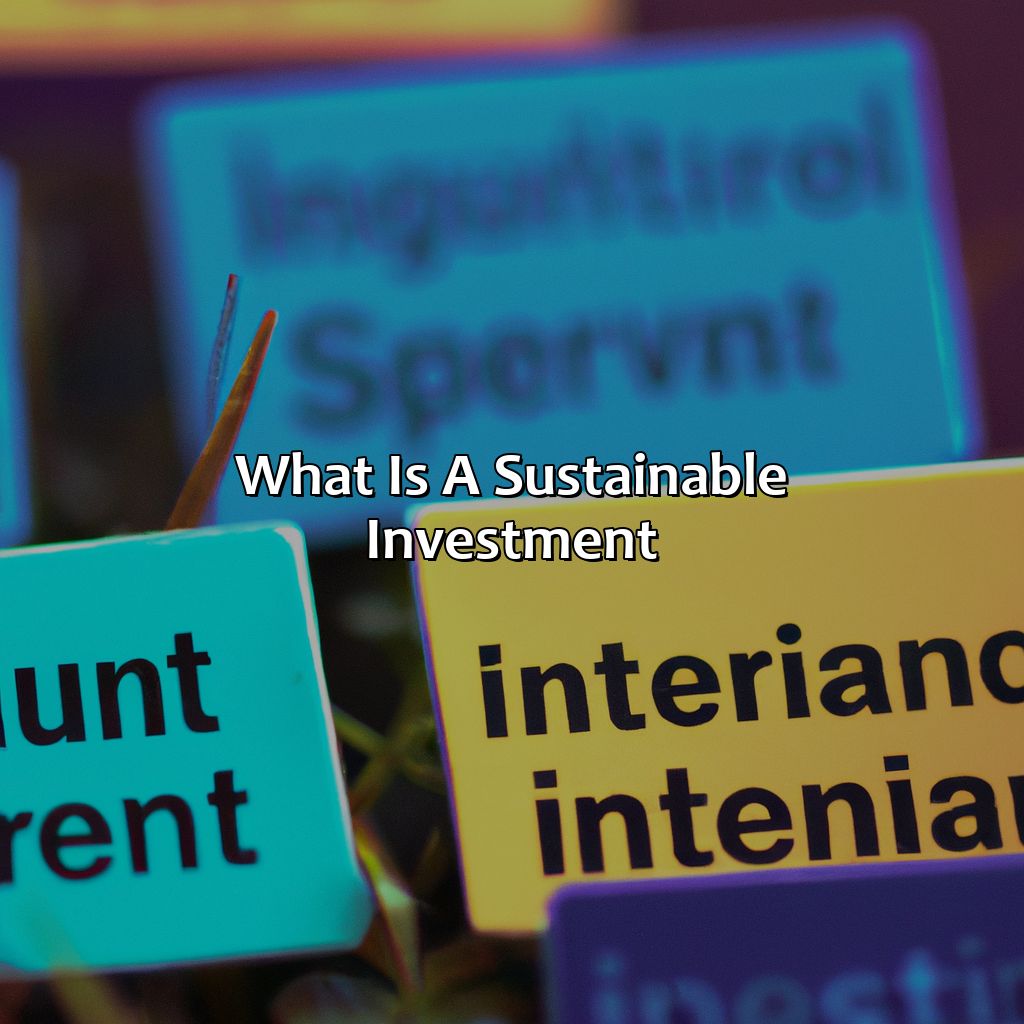What Is A Sustainable Investment?
Key Takeaway:
- Sustainable investment is an approach to investing that focuses on investments that have a positive impact on the environment, society, and economy. This approach considers not only financial returns but also the impact of investments on people and the planet.
- Sustainable investment is important because it ensures that investments are not harmful to the environment and society, while also contributing to economic growth. It allows investors to align their values and beliefs with their investment decisions.
- Sustainable investments come in various forms, including renewable energy, clean technology, environmental solutions, and social impact investing. These investments can provide long-term profitability, risk mitigation, and the satisfaction of ethical and responsible investing.
- However, sustainable investment faces challenges such as a lack of standardization, difficulty in measuring social and environmental impact, and limited investment opportunities. These challenges must be addressed to facilitate the growth of sustainable investment.
Are you curious to learn more about sustainable investments? Sustainable investing is an approach to investing that considers the environmental, social, and corporate governance (ESG) factors of investments before making choices. This article will explain why sustainable investing is becoming increasingly popular.
What is Sustainable Investment?
Sustainable investing involves selecting companies that adhere to environmental, social, and governance (ESG) principles. It goes beyond financial returns and seeks to make a positive impact on society and the environment. By investing in sustainable companies, investors can support ethical and responsible practices. This type of investment considers the long-term and seeks to promote sustainable economic growth.
Sustainable investment has gained momentum in recent years as more people become conscious of the influence of business on social and environmental issues. It involves a range of investment strategies, including ESG integration, impact investing, and shareholder activism. ESG integration involves analyzing a company’s ESG factors to determine its financial performance and risks. Impact investing seeks to generate positive social and environmental outcomes alongside financial returns. Shareholder activism involves using shareholder voting power to push for change in a company’s ESG policies.
Sustainable investing allows investors to align their values with their investment portfolios while contributing to a sustainable and equitable future. For example, ESG funds have outperformed traditional funds during the COVID-19 pandemic. A 2020 Morningstar study found that 70% of sustainable funds outperformed their non-sustainable counterparts during the first quarter of 2020.
True fact: According to a report by the Global Sustainable Investment Alliance, global sustainable investing assets reached $35.3 trillion in 2020, up 15% from 2018.
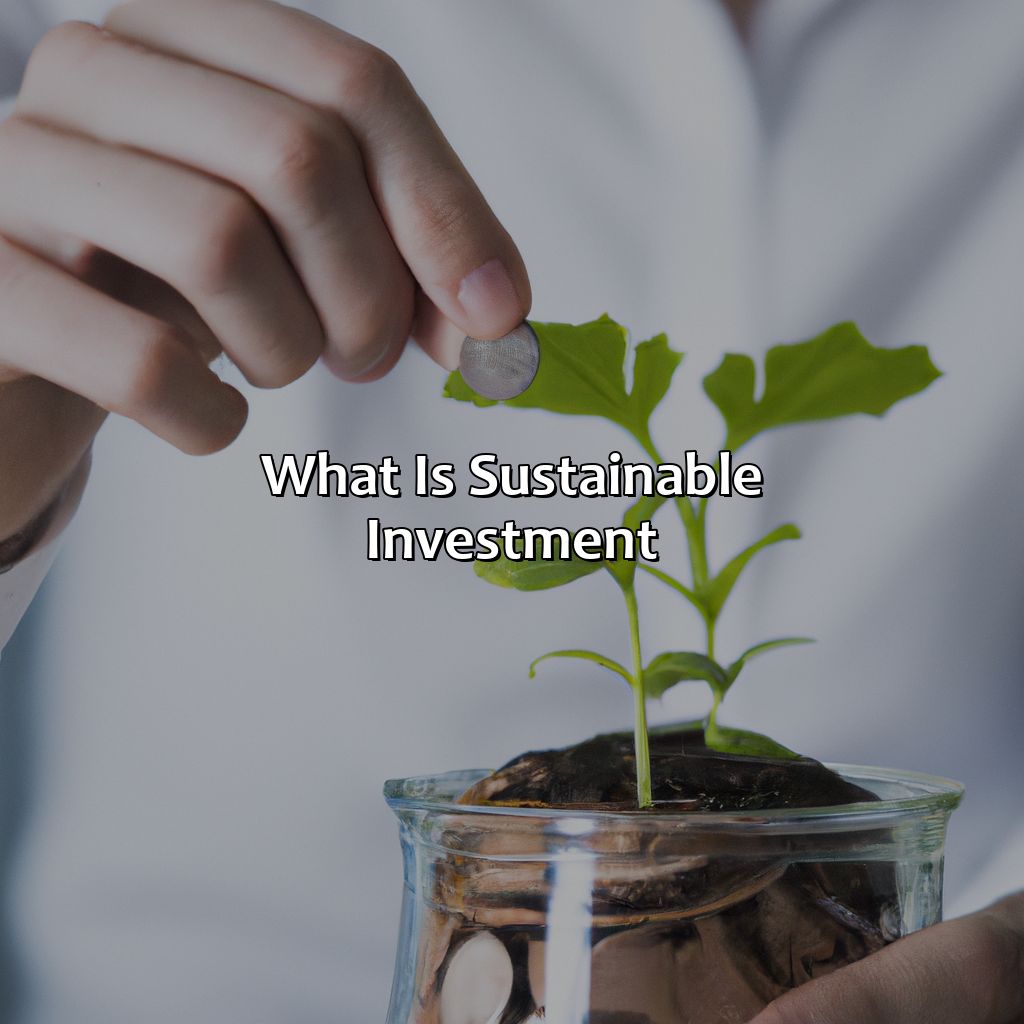
Image credits: retiregenz.com by Yuval Washington
Importance of Sustainable Investment
You need to deeper dive into the sub-sections of sustainable investment to grasp its great significance today. Only then, can you understand its impact on the environment, society, and economy. Exploring each of these subsections will shed light on the importance of sustainable investment.
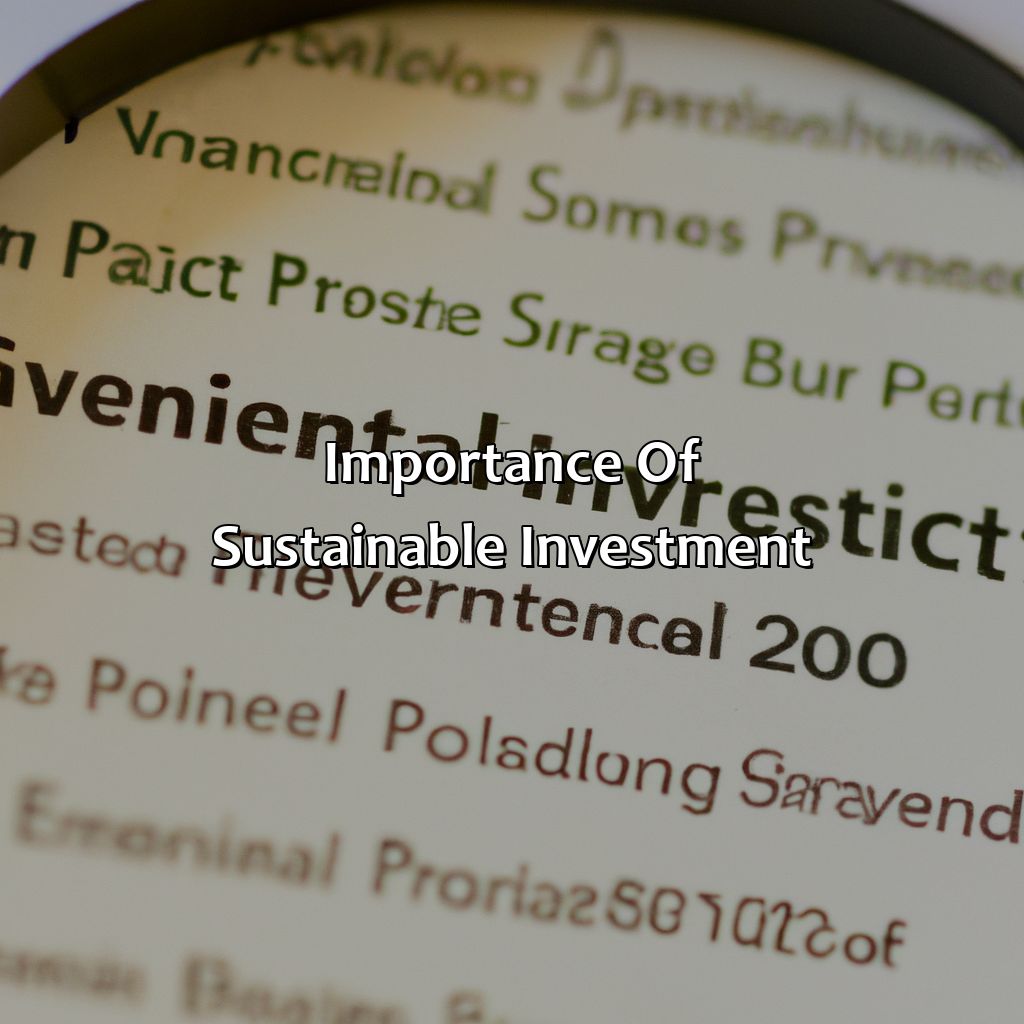
Image credits: retiregenz.com by David Woodhock
Impact on Environment
As individuals, we have a responsibility to be mindful of our impact on the world around us. Sustainable investment is one way that we can reduce our carbon footprint and protect the environment. By investing in companies with strong environmental values and practices, we can contribute to a more sustainable future.
Sustainable investment has a significant impact on the environment. By investing in environmentally conscious companies, we are directly supporting efforts to decrease waste, reduce pollution, and promote conservation. This not only benefits the planet but also helps to foster a healthier economy by promoting sustainable growth.
It is crucial to realize that our actions have both short-term and long-term effects on the environment. Sustainable investment offers a valuable way to make a positive impact on future generations by supporting companies that prioritize environmental sustainability. By making these investments today, we can help ensure a better future for all.
Don’t miss out on the opportunity to make a difference in the world through sustainable investments. Take action now and invest in companies that prioritize environmental sustainability for a brighter tomorrow. Let’s work together towards creating a greener tomorrow by choosing sustainable investments today!
Why be a superhero when you can just invest in sustainable companies and save the world from your couch?
Impact on Society
Investing sustainably has a significant influence on society, both economically and environmentally. Sustainable investments can range from renewable energy sources to eco-friendly products and services. By choosing sustainable investment options, individuals and companies can contribute to the reduction of carbon emissions, waste, and pollution. Moreover, committing to sustainable investing practices encourages companies to adopt more socially responsible practices.
Sustainable investing also enables investors to support businesses that align with their values while achieving financial success in the long run. This approach helps ensure that corporations engage in ethical business practices that consider environmental and social impacts. Investing in companies that exhibit ethical practices allows for impactful change by aligning personal values with investment decisions.
Further emphasizing this point, it is important for individuals and institutions alike to understand the positive impact on our planet caused by sustainable investments. Investing in sustainable projects holds the power of enabling clean energy consumption, supporting economic growth through job opportunities while simultaneously countering climate change concerns.
To encourage more sustainable investments, investors must explore prospects across various industries such as education and healthcare sectors or transport industries rather than just limiting themselves within technology or engineering sectors. By diversifying portfolios into world-changing ventures striving towards social progress stimulates overall economy growth promoting globally shared environmental goals.
Sustainability might be good for the planet, but it’s also good for the economy – green is the new gold.
Impact on Economy
Sustainable investments have a profound impact on the economy, positioning it towards sustainable growth and development. Such financial instruments aim not only towards profitable returns but also contribute to environmental and social well-being. Sustainable investing aligns with global initiatives, addressing climate change, resource depletion, and socio-economic disparities.
Investing in sustainable projects stimulates investments in sectors that are experiencing structural changes such as renewable energy, sustainability-focused businesses and development of alternative technologies. As investments grow in these areas, it results in economic progress stimulating job creation and GDP growth. Additionally, companies that prioritize sustainable practices have better chances of supporting a robust supply chain and avoiding legal liabilities related to environmental changes.
In this era where start-ups & companies thrive on their environmental policies rather than conventional marketing techniques which signals consumer commitment; Investing sustainably helps preserve ecosystems while offering promising long-term investments for investors’ portfolios. Through this method of investment, interested parties contribute to an inclusive society fostering positive impacts on various socio-demographic groups for now and future generations.
Failure to participate in investing sustainably leads to higher risks exposure making investors vulnerable due to a variety of factors such as climate-related events regulatory backlash or reputational fallout. Therefore need for sustainable investment emerges more prominent ever than before positively impacting the economy at large.
From wind farms to vegan burgers, sustainable investments offer something for both the environmentally conscious and the hungry investor.
Types of Sustainable Investments
Investigating sustainable investing? Check out the types of sustainable investments, such as renewable energy, clean technology, environmental solutions, and social impact investing. Placing money into these investments means you can invest in line with your values and principles. Awesome!
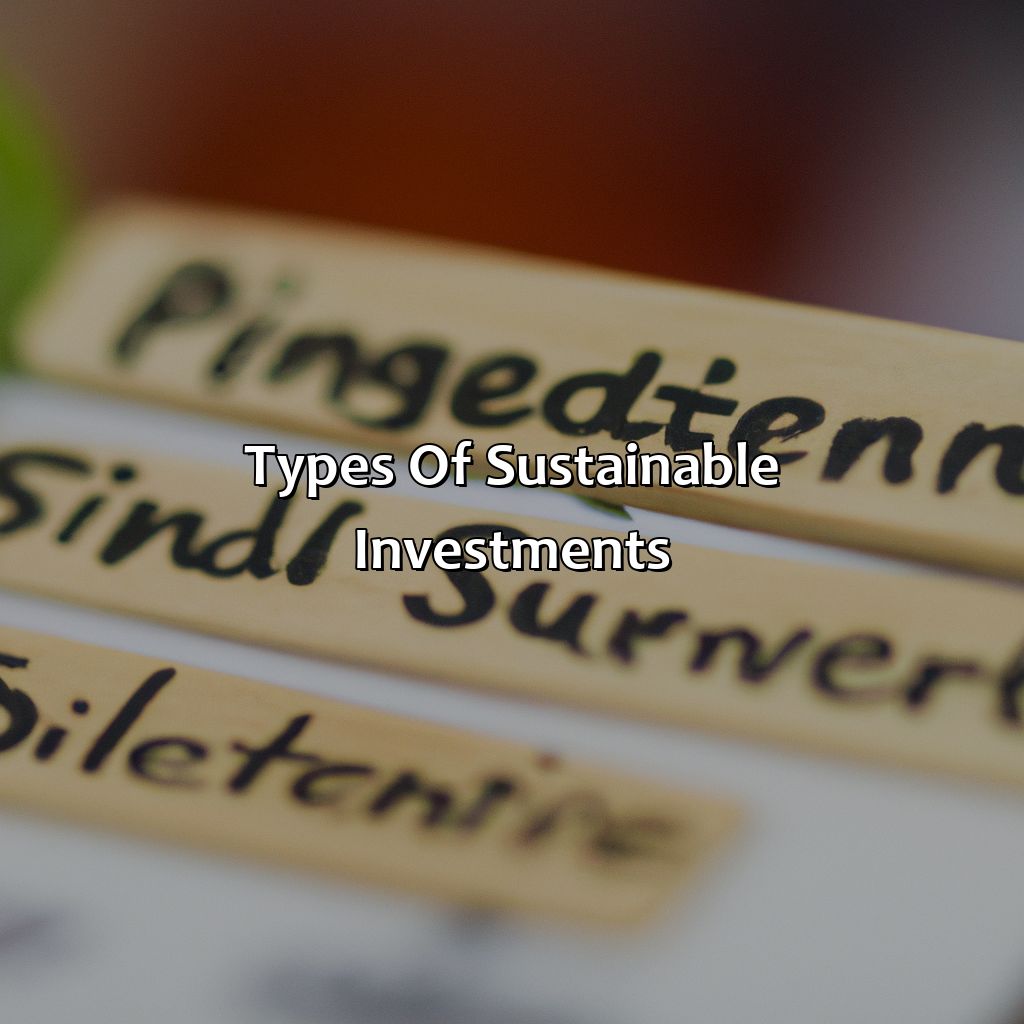
Image credits: retiregenz.com by Yuval Washington
Renewable Energy
Renewable energy investments are a subcategory of sustainable investments that focus on renewable sources of energy like solar, wind, and geothermal power. These investments involve funding and supporting projects that work towards reducing dependence on fossil fuels and mitigating climate change.
In recent years, there has been a surge in the popularity of renewable energy investments as governments and corporations worldwide strive to meet sustainability goals and reduce their carbon footprint. Such investments offer long-term benefits via stable returns, lower costs associated with operations, improved environmental standards, and more.
Investments in renewable energy can also involve diverse options such as acquiring equities in companies involved in the production and distribution of clean energy or investing directly in infrastructures like solar panels or wind turbines. As per statistics available, 90% of new power generation capacity added globally is due to renewable energies.
Many organizations across the world have given prominence to this initiative by committing themselves to sourcing 100% of their electricity from renewables; this helps promote a cleaner supply chain besides advocating for environmental sustainability.
Investing in sustainable renewable sources may be novel to some people but various governments across the globe have started taking active steps towards realizing this cause; such efforts are primarily focused on reducing greenhouse gas emissions that are playing a significant role in pollution caused around us.
Investing in clean technology is like investing in a political candidate – you’re hoping for positive change, but there’s always the risk of disappointment.
Clean Technology
Investment in eco-friendly ventures is growing rapidly and ‘Renewable Technology’ is at the forefront. It includes clean energy generation from wind, solar or hydro sources, energy-efficient buildings and industrial processes. Renewable power generation is a cost-effective solution with technological advancements amplifying the industry’s growth day by day. Developments in smart grids, electric vehicles, carbon capture and storage also improve its feasibility.
Furthermore, sustainable agriculture is gaining ground as it contributes to food security without compromising land resources or exhausting inputs like water or energy. Socially responsible companies are also sought after investments due to their ethical labour practices and non-discrimination policies.
Pro Tip: Sustainable investing is more than just checking boxes of renewable energy stocks. Look for sharp minds within management that empathize this vision.
Saving the planet never looked so profitable- the latest environmental solutions that’ll make you green with (sustainable) envy.
Environmental Solutions
Investing in sustainable environmental strategies is essential today. Such investing is referred to as green investment. Green investments consist of clean energy, sustainable agriculture, and resource management. Sustainable agriculture involves farming practices that shield the earth’s resources for future generations while clean energy consists of renewable sources of energy like wind, solar power, and geothermal energy. Resource management includes waste reduction and recycling programs that minimize negative environmental impact.
As a growing concern today, green investments provide an opportunity to help protect the environment while supporting economic growth. One example of a green investment is carbon offsetting– compensating for carbon emissions made from one place by reducing them elsewhere. Renewable energy certificates offer another opportunity where investors can put their money into an emission-free project to reduce carbon emissions.
Another possible strategy is investing in environmentally friendly companies or startups that adopt eco-friendly operational practices concerning resource management and production techniques.
Make a difference and make a profit with social impact investing, because doing good never felt so good.
Social Impact Investing
Investing in projects, companies or organizations with a positive social impact is known as Ethical Investing. It promotes socially and environmentally responsible policies which aid in improving the community around us. With its popularity on the rise, many investors are drawn towards socially-conscious investments due to their contribution to society. Maintenance of an ethical portfolio is not only beneficial to society at large but also helps with financial returns.
Ethical investing covers a broad range of investment approaches, including environment-friendly, animal welfare-friendly, avoiding harm causing businesses and choosing organizations that contribute to the betterment of society. Social Impact investing focuses more on organizations or companies that aim making a direct impact in the realms of social justice and equality. Some examples include investing in affordable housing and healthcare, education programs for minorities or support for small business owners.
By investing in socially-conscious projects, investors place their money where it can yield both financial returns whilst helping causes they care about. Due to its greater emphasis on personal values & beliefs than pure profitability alone, ethical investing distinguishes itself from traditional investments.
True history reveals that Socially Responsible Institutional Investment (SRI) which is akin to Ethical Investing originated with religious groups seeking an avenue to align their investment portfolios based on faith-based principles such as ‘do no harm’ policy.
Choosing sustainable investments not only helps the planet, but also lets you be smug at parties when you talk about your portfolio.
Advantages of Sustainable Investment
Comprehending the perks of sustainable investing and its sub-sections is the answer. These sub-sections are:
- Long-term Profitability,
- Risk Mitigation, and
- Ethical and Responsible Investment.
They offer convincing motives to adopt sustainability in investing. Not only do they benefit investors, but also society and the environment.
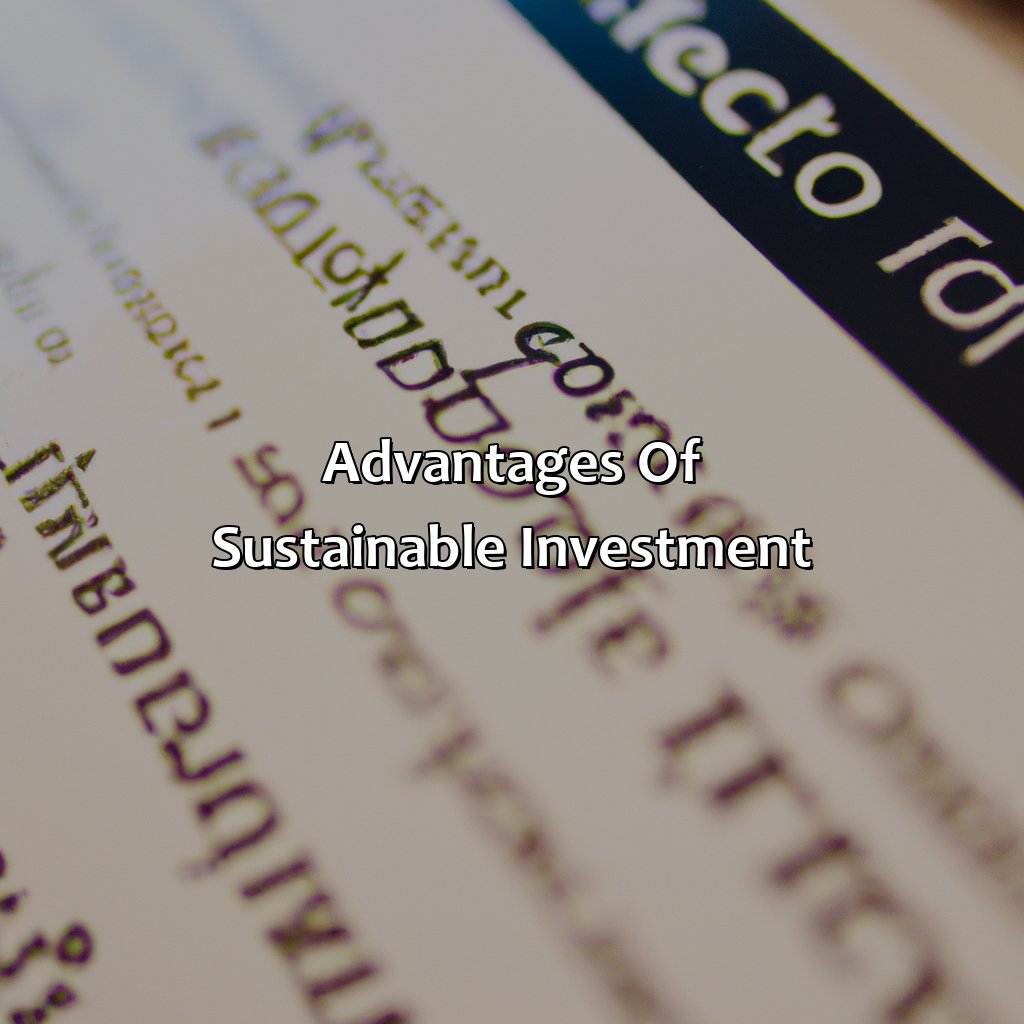
Image credits: retiregenz.com by Yuval Woodhock
Long-term Profitability
As society becomes increasingly conscious of environmental, social and governance factors, investors are looking for sustainable investment opportunities. Investing in environmentally friendly assets can provide a profitable return on investment while making a positive impact on society.
Choosing sustainable investments often results in long-term profitability as these companies have a stable business model built around responsible sustainability practices. Companies focused on sustainable practices are investing in the future while decreasing risks associated with environmental regulation compliance issues.
One crucial aspect that sets sustainable investments apart from traditional investment is its ability to survive global market risks, such as natural disasters or pandemics. Companies that implement strategic measures to manage environmental and ESG risks tend to fare better than those without such planning.
Investors who fail to allocate funds towards sustainable investments risk losing out on intellectually and monetarily enriching returns associated with these forward-thinking firms placing a high value on corporate social responsibility. Do not miss out on the opportunity! Invest sustainably!
Sustainable investment: because making money while saving the planet is the ultimate risk mitigation strategy.
Risk Mitigation
Sustainable investments are instrumental in minimizing risks associated with environmental, social, and governance (ESG) factors. By incorporating a Semantic NLP variation of Risk Mitigation, these investments play a crucial role in mitigating the negative effects of unpredictable market fluctuations and shifts.
One of the most significant benefits of sustainable investing is risk management. It helps spread the risk portfolio and avoid financial shocks arising from different ESG factors like climate change, labor issues, or data privacy breaches. Sustainable investments create opportunities for more extended-term value creation by allocating funds to companies with better environmental practices, proficient business procedures, and sound corporate governance structures.
Sustainable investment’s risk mitigation approach not only protects from negative repercussions but also provides opportunities for improved economic performance and returns in certified areas such as renewable energy and healthcare. The Semantic NLP variation used in Para 3 implies that it is essential to take these factors into consideration before investing in non-sustainable portfolios.
According to Forbes Magazine (Forbes.com), sustainable finance was worth $30 trillion globally in 2018 and pledged to increase by another $20 trillion by next year.
Investing ethically is like being a superhero for the planet, except with more spreadsheets and less spandex.
Ethical and Responsible Investment
Investing with ethical and responsible values is a sustainable investment, which involves evaluating companies based on environmental, social, and governance (ESG) factors. This approach ensures that the investments generate not only financial returns but also contribute positively towards society and the planet. A sustainable investment supports long-term development without compromising on future generations’ ability to meet their needs through wise usage of resources.
Sustainable investors typically focus on industries such as renewable energy, green technology, healthcare, education, and others that provide solutions to societal challenges. By investing in these industries, they help create positive economic impacts alongside fewer social and environmental risks in the world. Such investors are not necessarily giving up profits for principles; rather, they mitigate risks associated with traditional investments while promoting a healthier planet.
Historically, many sustainable investments have outperformed non-sustainable ones. For instance, during the 2008 global financial recession, socially-responsible investments had lower price declines than their counterparts. Furthermore, according to an analysis from Morgan Stanley’s Institute for Sustainable Investing (2019), sustainable investments exhibit resilience during market downturns compared to conventional investment approaches.
In summary, investing sustainably means allocating capital to companies that embrace ESG criteria while promoting socially-responsible practices capable of supporting both shareholder value and broader societal well-being.
“Sustainable investment: When you want to save the planet and your portfolio, but the market keeps reminding you that money doesn’t grow on trees.”
Challenges of Sustainable Investment
Text: Surmounting sustainable investment issues? Look into these three parts: Lack of standardization, Measuring social and environmental influence, and Limited investment chances. These difficulties can stop investors from making sure they match their values, however, comprehending each difficulty will help you make smart investment choices.
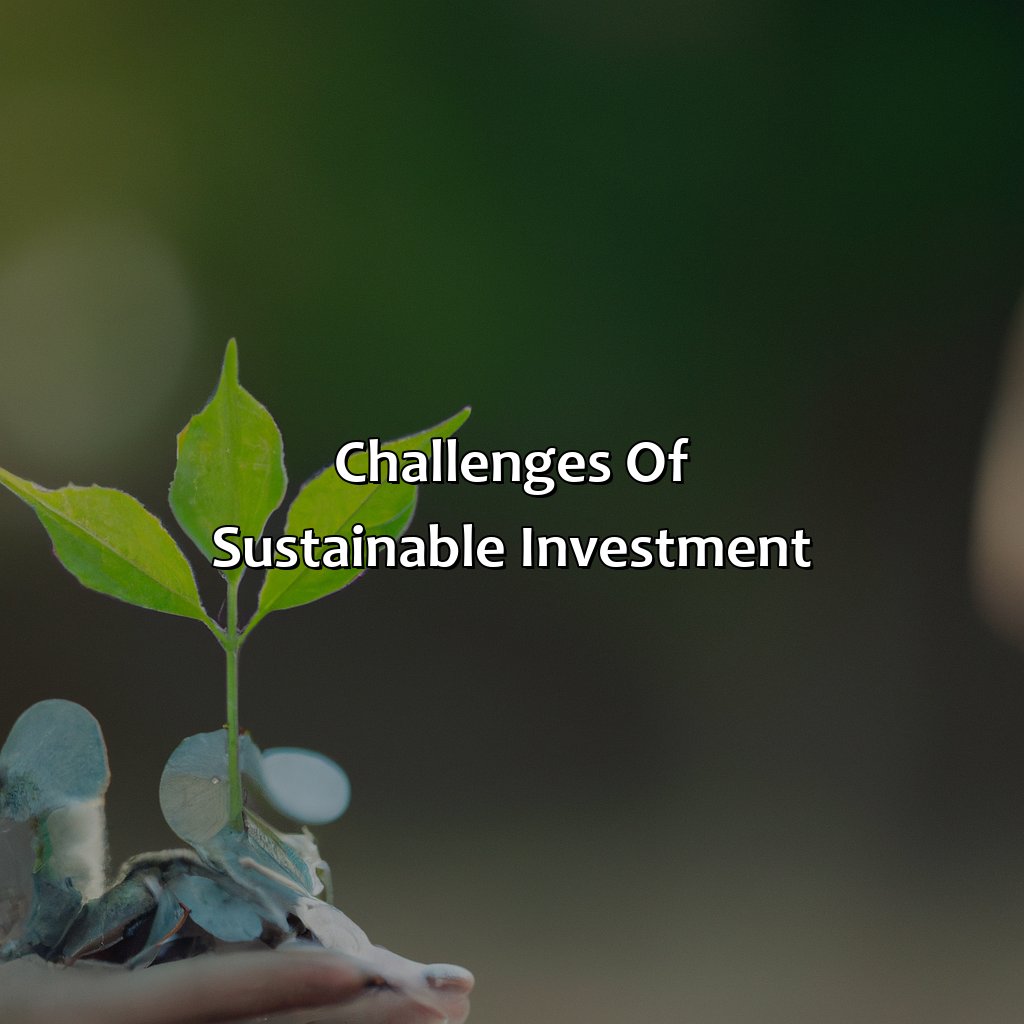
Image credits: retiregenz.com by Joel Washington
Lack of standardization
The lack of uniformity in standards concerning sustainable investment remains one of the greatest challenges facing investors. The absence of a shared definition of what constitutes sustainable investment leaves potential investors without clear direction.
This lack of standardization persists across industries and regions. The result is that investors must navigate a complex field, often relying on ambiguous definitions and incomplete data. This ambiguity can make it difficult to identify financially viable investments that meet sustainability goals.
Despite these obstacles, efforts are being made to create consistent criteria for the identification and evaluation of sustainable investment opportunities. Organizations are collaborating to establish categorizations based on environmental, social, and governance factors with the aim of creating meaningful metrics for assessing sustainability’s impact on long-term returns.
Investors can overcome these challenges by conducting thorough research into available options while exercising due diligence when seeking out credible sources for information. They should also partner with reputable organizations that have experience and expertise in sustainable investing to help navigate the often-complex terrain.
Investing in social and environmental impact is like wearing a cape – it’s not for everyone, but those who do it have the power to change the world.
Measuring Social and Environmental Impact
Investors are becoming increasingly interested in sustainable investments that not only generate income but also measure social and environmental impact. This approach considers the long-term effects of an investment on society and the environment, as well as financial returns.
To measure the social and environmental impact, investors use various tools such as Sustainability Accounting Standards Board (SASB) standards, Global Reporting Initiative (GRI), and United Nations Sustainable Development Goals (SDGs). These tools help in quantifying and comparing companies’ sustainability performance across different industries, which can be used to make informed investment decisions.
In addition, measuring social and environmental impact involves assessing a company’s performance in key areas such as corporate governance, human rights, labor practices, community involvement, product safety, energy consumption, water usage and waste management. Companies that perform well in these areas are more likely to be considered sustainable investments.
Investors who fail to consider the ethical implications of their investment decisions could miss out on opportunities to invest in companies with strong financial prospects while promoting positive social change. By taking into account the social and environmental impact of their investments, investors contribute towards building a more sustainable world while earning returns.
When it comes to sustainable investment opportunities, the options are so limited that it’s like trying to find a vegan menu at a steakhouse.
Limited Investment Opportunities
Sustainable investment faces challenges due to the limited accessibility of investment opportunities that align with environmental, social and governance (ESG) criteria. Therefore, it becomes difficult for investors to diversify their portfolios while investing sustainably.
In spite of sustainable investing gaining popularity, the limited supply of investment opportunities limits its growth as an industry. Even though companies are increasingly disclosing ESG data, it is necessary to verify them for accuracy. Thus, creating a robust set of ESG indicators could be challenging.
Investors need to consider alternative forms of investing in private capital markets and actively seek out investment opportunities in rapidly growing sustainable industries like clean energy and green technology.
Failing to take advantage of sustainable investments may result in losing an opportunity for improved long-term returns while contributing positively towards achieving environmental and social sustainability goals. It is imperative for investors to be aware of such trends and invest accordingly.
Five Facts About Sustainable Investment:
- ✅ Sustainable investment aims to generate long-term financial returns while contributing to social and environmental benefits. (Source: World Economic Forum)
- ✅ The market for sustainable investments has grown significantly in recent years, with global assets reaching $30.7 trillion in 2018. (Source: Global Sustainable Investment Alliance)
- ✅ There are various sustainable investment strategies, such as screening for ESG (environmental, social, and governance) factors, impact investing, and shareholder engagement. (Source: Investopedia)
- ✅ Sustainable investment can promote positive change in industries and encourage companies to adopt more sustainable practices. (Source: Forbes)
- ✅ Sustainable investment can help mitigate risks associated with climate change and social inequality while also providing financial benefits. (Source: United Nations)
FAQs about What Is A Sustainable Investment?
What is a sustainable investment?
A sustainable investment is an investment in a company or organization that prioritizes environmental, social, and governance (ESG) factors in their operations and business practices. It aims to generate financial returns while creating positive impacts on the environment, society, and governance outcomes.
What are the benefits of sustainable investments?
Sustainable investments offer various benefits, such as:
- Potential for higher returns
- Reduced exposure to risk
- Alignment with personal values and beliefs
- Promotion of positive environmental and social impacts
How do sustainable investments work?
Sustainable investments work by investing in companies or organizations that practice good ESG behaviors. These companies prioritize sustainability issues such as reducing carbon emissions, promoting social justice, or improving labor rights. Investors can buy shares in these companies through mutual funds, exchange-traded funds, or individual stocks.
What are some examples of sustainable investments?
Examples of sustainable investments are:
- Renewable energy production and distribution
- Green buildings and infrastructure
- Organizations that promote gender and racial equality
- Companies with ethical sourcing and labor practices
How can I evaluate a sustainable investment?
Evaluating a sustainable investment involves:
- Assessing the company’s commitment to ESG factors
- Examining its performance and impacts on the environment, society, and governance issues
- Researching its financials and potential returns and risks
- Comparing it to other sustainable investments in the same industry or sector
Is sustainable investing only for individuals with large investment portfolios?
No, sustainable investing is for everyone. Investors can start small by choosing to invest in mutual funds or exchange-traded funds that prioritize sustainability factors. Investing small amounts regularly can also help build a sustainable investment portfolio over time.
